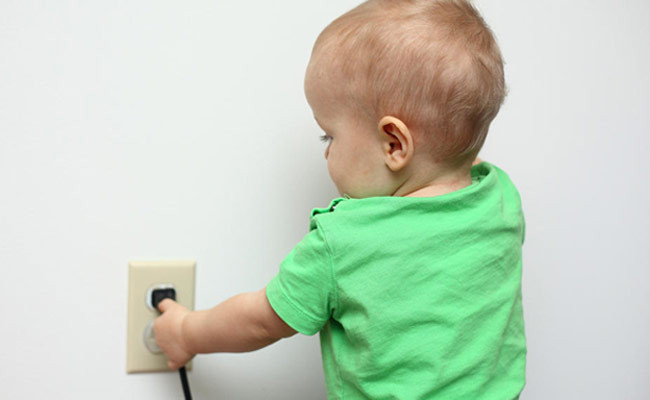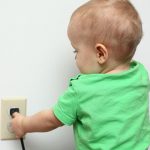Statistics show that it’s 9 year old boys who are most at risk of electric shock because they seem to be fascinated by how things like toasters work and are likely to poke a fork down into small appliances. It’s important to know that there is a risk of shock if the plug is still in the socket, even if the toaster is switched off. However, toddlers are also at risk simply because they tend to do things you don’t expect and can move very quickly.
For instance, many toddlers love to put things into containers and think it’s fun to throw their dummy or toys into the bath if they get a chance. This can still be a game to them when a sibling is in the bath. In fact, one toddler threw a fan heater that was switched on into a bath full of water where his older brother was playing.
The result could have been fatal except that the cord was a little short and the force of the throw jerked the plug far enough out of the socket to break the connection. Other toddlers see a hole in the wall and want to poke something into it. They don’t understand that it’s an electric socket. So here are some tips to keep your toddlers safe from electricity.
- Only have a wall heater in the bathroom. This makes it safe from water splashes as well as being picked up by a toddler.
- Use safety plugs on all your power points, even the ones you don’t think your toddler can see or reach.
- Don’t leave cords within reach of toddlers as they are sure to pull them or even bite them.
- Don’t leave cords across a walkway, even under a mat as they can still be a tripping hazard and it forces wear and tear onto that part of the cord.
- Keep toasters and kettles well out of reach and unplug them when not in use, don’t just rely on them being switched off.
- Teach your older children how to be safe around electricity. For instance, if bread gets stuck in the toaster, teach your child to unplug it before poking it out with a fork or finger.
- Also teach them to hold the plug on the end of the cord to pull it out, not the cord itself. Pulling on the cord is dangerous and can snap the wires inside.
- Never handle switches or appliances with wet hands, or if you are wet from the shower.
- Never allow kids to climb onto the roof to get a ball, or to poke one down with a rake, in case they touch the electricity wires.
- Don’t allow kites or other flying toys to be used near power lines
- Don’t allow your toddlers to stay in their paddle pool when a thunderstorm is brewing. Water is a good conductor of electricity and lightning is likely to strike near enough to be dangerous.





